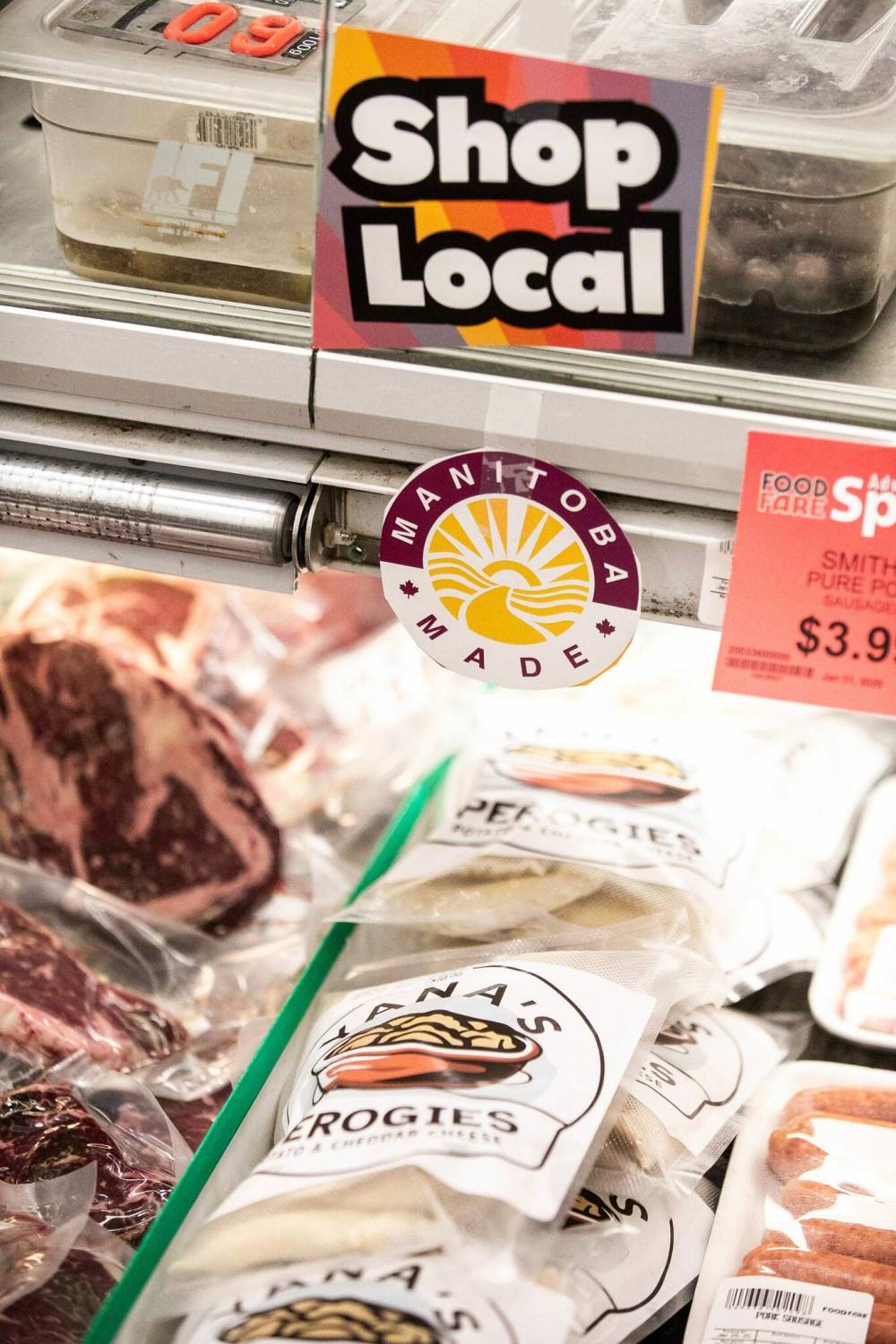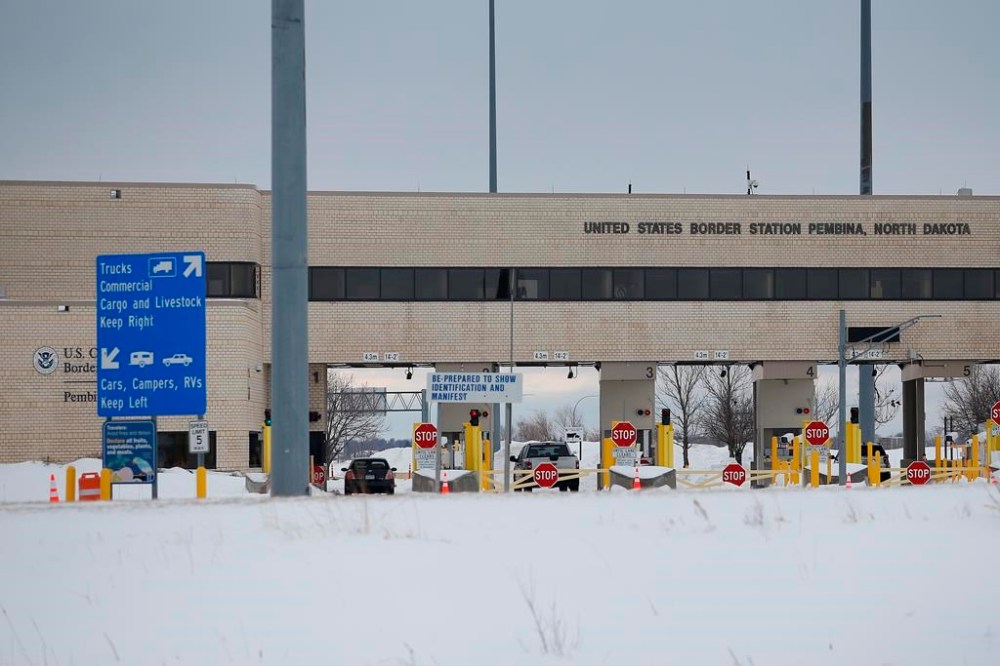‘Shop Canadian’ rallying cry gains strength Prospect of cross-border tariffs, price increases puts public, politicians in patriotic mindset
Read this article for free:
or
Already have an account? Log in here »
To continue reading, please subscribe:
Monthly Digital Subscription
$0 for the first 4 weeks*
- Enjoy unlimited reading on winnipegfreepress.com
- Read the E-Edition, our digital replica newspaper
- Access News Break, our award-winning app
- Play interactive puzzles
*No charge for 4 weeks then price increases to the regular rate of $19.95 plus GST every four weeks. Offer available to new and qualified returning subscribers only. Cancel any time.
Monthly Digital Subscription
$4.99/week*
- Enjoy unlimited reading on winnipegfreepress.com
- Read the E-Edition, our digital replica newspaper
- Access News Break, our award-winning app
- Play interactive puzzles
*Billed as $19.95 plus GST every four weeks. Cancel any time.
To continue reading, please subscribe:
Add Free Press access to your Brandon Sun subscription for only an additional
$1 for the first 4 weeks*
*Your next subscription payment will increase by $1.00 and you will be charged $16.99 plus GST for four weeks. After four weeks, your payment will increase to $23.99 plus GST every four weeks.
Read unlimited articles for free today:
or
Already have an account? Log in here »
Hey there, time traveller!
This article was published 31/01/2025 (341 days ago), so information in it may no longer be current.
Bonnie Palmer has started to check labels.
Cheese, chips, side dishes — is there a maple leaf somewhere? A line saying “Made in Canada” or, more locally, Manitoba?
Canadian-made goods, to Palmer, are now a better purchase than any American alternative.
“Sometimes it’s a little bit more expensive, but I think (we) need to do things like that in order to protest,” Palmer said during a recent Real Canadian Superstore run in Winnipeg.
Tariff hotline live
Manitoba’s tariff hotline will be available this weekend in anticipation of trade changes coming from the United States today.
The resource was created for Manitoba businesses and workers to receive information and voice concerns regarding tariffs.
People can reach the Manitoba government at 204-945-8011, toll-free at 1-877-827-4330, or via email at tariffresponse@gov.mb.ca.
The tariff hotline is also available through a form on the provincial government’s website.
The potential of tariffs on Canadian exports to the United States prompted Palmer to change her shopping habits.
U.S. President Donald Trump signalled he’d enact tariffs on Canadian goods starting today. He’s mulled broad 25 per cent duties. Nothing was publicly cemented Friday.
Uncertainty has blanketed Canadians in the weeks leading up to Feb. 1.
Private-sector firms and lobbyists have met with counterparts across the southern border, reaffirming trade relationships and expediting goods shipments. Governments — including Manitoba’s — have formed trade councils and considered retaliatory action.
Canada has poured an additional $1.3 billion into border security in an attempt to assuage Trump, who initially threatened tariffs as an emergency measure to prompt more secure borders. He’s since accused Canada of taking advantage of the United States via the trade deficit between the two nations.
Amid the chaos, Canadian politicians have uttered a battle cry: shop local.
Some Manitobans have taken up the mantle. Others are waiting for America’s crackdown and Canada’s response to become official.
Meantime, a province-wide “Shop Canadian” campaign may be incoming as local manufacturers look to sell outside the U.S.
However, buying local isn’t always easy, experts warn.
“As a matter of fact, the last time I was here, I was thinking, ‘A lot of this comes from the States,’” said Cam Cox.
He stood in a Superstore produce aisle, arms-length away from the strawberries. He hadn’t shifted to buying more Canadian products — yet. A 25 per cent tariff and resulting higher prices for consumers could be cause for change, Cox said.
Businesses may pass the duty’s cost to consumers. If Canada implements its own tariffs against the U.S., more products’ prices will be affected.
Prime Minister Justin Trudeau has promised “everything is on the table” for retaliation.
Jennifer Donald, a manager at Downtown Family Foods in Winnipeg, expects customers will follow deals.
“Honestly, with the cost of everything, people are shopping for whatever is the cheapest,” she said.
MIKAELA MACKENZIE / FREE PRESS 
Still, some have been intentional about buying local. It’s why Food Fare highlights Manitoba-made items using signage. The trend began during the COVID-19 pandemic and has surged again amid Trump’s warnings, said manager Ramsey Zeid.
“I think that the ‘Shop Canadian’ movement is going to grow,” he said.
Lists spotlighting Canadian substitutes for American-made goods — Armstrong Cheese instead of Kraft, for instance — are circulating on social media.
But Palmer, who’s new to checking labels, is having a hard time.
“They will say ‘Canadian,’ but then if you look farther down, it says ingredients from another place, in the States or something,” she said.
Many goods travelling between Canada and the United States are intermediate products, ready for finishing in one country or the other. The countries’ integration has snowballed over three decades of free trade agreements, said University of Manitoba economics associate professor Fletcher Baragar.
Manitoba businesses must decide whether they’ll drastically change operations over Trump’s ambiguous threat, Baragar noted.
Regardless of the future, now is the time to boost sales within Canada — with tax and regulation reform on the government side and by diversifying markets within businesses, said Terry Shaw.
The Canadian Manufacturers & Exporters regional vice-president for the Prairies called the moment an “opportunity.”
“Having that much trade exposure with … one country can present some challenges,” Shaw stated. “(This is) a bit of a call to action.”
He pointed to an “Ontario Made” initiative fuelled by the CME and Ontario government. Item labels, advertising blitzes and a searchable database feature locally created goods. Upwards of 17,800 products are in the system; more than 781 retail locations participate.
Shaw hopes for something similar in Manitoba. He flagged Ontario Made to provincial government officials last week, he said.
“Should they be interested in a program like this, instead of reinventing the wheel, we’ve got the institutional knowledge,” Shaw said. “We’ve got the templates.”
MIKAELA MACKENZIE / FREE PRESS
Premier Wab Kinew suggested part of Manitoba’s response to tariff threats will be “a more formalized campaign” promoting shopping locally.
Manitoba’s leader has joined a chorus of politicians, including Trudeau and Ontario Premier Doug Ford, urging Canadians to spend money at home.
“I don’t necessarily know that (shopping local is) going to make a huge difference, but I do think it’s more symbolic,” said Chuck Davidson, president of the Manitoba Chambers of Commerce.
“(Canadians are) understanding that with the tariffs, these are some challenging times ahead for our economy. Anything that can be done to support those local businesses is going to be a positive.”
JOHN WOODS / THE CANADIAN PRESS FILES
Manitoba is in a trade imbalance with the United States, but the U.S. is the larger benefactor, Davidson noted.
Manitoba imported roughly $23 billion worth of American goods in 2023; it exported $15.4 billion, as per the Manitoba Bureau of Statistics. (The Canadian Chamber of Commerce data pegs the export number at $18.7 billion.)
The Canadian market isn’t a full replacement for the U.S., Shaw from the CME underscored. California’s population alone is nearly the size of Canada’s.
Local companies have paused investments and expedited shipments south in anticipation of tariffs. It’s hard to know when the impact of Trump’s threatened tariffs will be fully felt, Davidson relayed; some businesses have stockpiled goods.
“It’s not like the tap is turned off,” Baragar added about exports. “It’ll be a process, I think, of a gradual diminishment of export volumes.”
American-made alcohol not pulled off shelves — for now
Manitoba is staying quiet about whether it will threaten to diminish United States-produced alcohol sales in response to tariffs, following other provinces’ leads.
Manitoba is staying quiet about whether it will threaten to diminish United States-produced alcohol sales in response to tariffs, following other provinces’ leads.
Earlier this month, B.C. Premier David Eby floated the idea of halting American liquor imports. Ontario Premier Doug Ford said he’d ban U.S. alcohol sales at LCBO stores if 25 per cent tariffs appear.
Glen Simard, minister responsible for Manitoba Liquor & Lotteries Corp., hasn’t issued a directive for MLL to pull American drinks in response to tariffs. A spokesperson for the minister wouldn’t say whether an order of the kind is in the works.
MLL called it “premature” to comment on a potential directive. Roughly 13 per cent of the Crown corporation’s listed products — 659 of 4,753 — are imported from the U.S, a spokesperson said.
— Gabrielle Piché
Supply chains are not changed quickly, he stressed.
Almost $42 billion worth of goods trade between Manitoba and the U.S. annually, Canadian Chamber of Commerce data show.
Already, 28 per cent of Canadian manufacturers are seeking different markets, a CME survey recently found.
“It’s unfortunate that it’s come to this,” Davidson said. “Getting into a trade war with your largest trading partner is a lose-lose situation. Nobody’s going to win.”
He applauded the Manitoba government for the measures it’s taken. The province struck a U.S. trade council last week and launched a tariff hotline for Manitobans’ questions and comments. (The hotline will be open all weekend, when Trump’s decision is expected to take effect.)
Manitoba may defer business tax collection if tariffs come, Kinew said this week.
— with files from Maggie Macintosh
gabrielle.piche@winnipegfreepress.com

Gabrielle Piché reports on business for the Free Press. She interned at the Free Press and worked for its sister outlet, Canstar Community News, before entering the business beat in 2021. Read more about Gabrielle.
Every piece of reporting Gabrielle produces is reviewed by an editing team before it is posted online or published in print — part of the Free Press‘s tradition, since 1872, of producing reliable independent journalism. Read more about Free Press’s history and mandate, and learn how our newsroom operates.
Our newsroom depends on a growing audience of readers to power our journalism. If you are not a paid reader, please consider becoming a subscriber.
Our newsroom depends on its audience of readers to power our journalism. Thank you for your support.
















